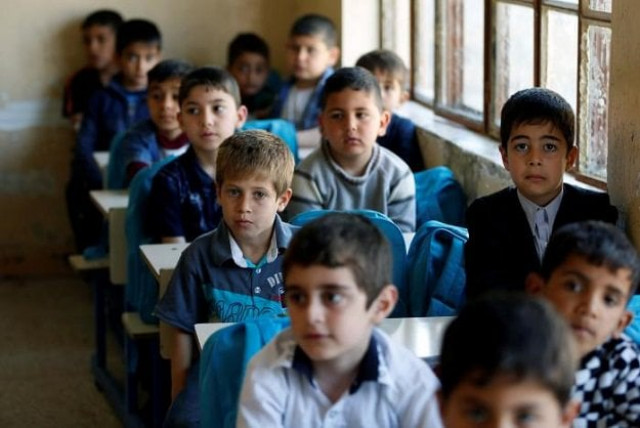Sindh education dept spends Rs3.75b with little to show for it
Funds were meant to upgrade primary, post-primary schools but dept failed to account for their expenditures

A representational image. PHOTO: REUTERS
The project
In 2017, the World Bank had disbursed $20.8 million for the project, which was kicked off in the same year and was supposed to be completed by December 2018. When The Express Tribune reached out to the Education secretary, Shahid Pervez, he said that the project had been divvied up into two phases. According to Pervez, 10 out of 12 schemes of the first phase had been completed by December 2018 and the remaining would be completed soon. The secretary, however, failed to provide a breakup of where the funds had been spent or which schools had been refurbished.
At the outset, the project was initiated on the orders of the chief minister and aimed to strengthen the current structure of the education sector in Sindh. The idea was to start off with the schools that had the highest enrollment, which in most cases were located in densely-populated areas. Scores of students studying in these schools complete their primary education each year. Hence, there was an urgent need to upgrade them to post-primary schools.
The disparity
According to the education department’s own statistics, a staggering 68% of 4.2 million students are enrolled in hardly 24% of the primary schools in Sindh.
Initially, the education department identified 4,560 schools that were in dire need of upgrades. Of these, 3,890 schools were selected for upgrade under the prorgramme. According to the education department’s records, there were 998,202 students enrolled in these schools. The figure was further brought down to 2,885 schools, which was a little higher than the 2,500 schools recommended by the World Bank.
The Education Works department estimated the cost of upgrading the schools at Rs2.43 billion. This amount, it said, would be used to construct 9,582 classrooms along with boundary walls, washrooms and roofs, among other things. Moreover, Rs8 billion were required for maintenance and repairs in the schools.
The discrepancies
The PC-1s, which are the project proposals, from the schools were prepared after estimation and field surveys by the engineers of the Education Works Department. All the PC-1s were presented to the Provincial Development Working Party (PDWP), which approved them on January 26, 2018. Subsequently, the Sindh Education and Literacy Department granted the administrative approval of 29 schemes in February 2018. The next month, the finance department also confirmed it and released Rs3,750 million on March 27, 2018.
Warning signs
Sometime later, the Sindh Public Procurement Regulatory Authority (SPPRA) had issued a notice to all the executive engineers of the Education Works department, seeking details of the tender notices that had been issued for the purchase of vehicles, the names of schools they had been purchased against and details of any work that had been carried out in the respective schools.
The notice made it clear that the Sindh Procurement Rules issued in 2010 were subjected to amendments in 2018, which make it mandatory for the tender notices to carry all the details of the project and its scope.
However, several executive engineers failed to provide the necessary details of individual schools where the renovation work had allegedly been carried out. What the engineers had in fact done was that they had clubbed together a number of schools in a scheme and then listed the expenses as part of the scheme. The documents related to the procurements neither listed the names of the school nor how much had been spent on each one. Such an approach does not allow the estimation of work required at each school, thus eluding transparency and restricting open competition, the regulatory authority noted.
Taken to court
The notice states that procurement agencies have been notified of the issue, however, they have still taken no practical measures to address and eliminate the irregularities.
Meanwhile, a representative of Transparency International - an international NGO -- had approached the Supreme Court regarding the issue, wherein they sought details pertaining to the tendering procedure.
In turn, the court asked the procurement agency to address the questions, but the response submitted by a representative of the concerned procurement agency was against Rule 17 (3) (c) of the amended 2018 Sindh Procurement Rules (2010).
The procurement agencies were further directed in the letter to rectify the situation per the rules. They were also directed to begin the process of procurement afresh.
Directing the agencies to mandatorily follow the Sindh Public Procurement (SPP) rules, the authority warned that if the fresh tenders had any such discrepancies, they would not be published by the authority on its website.
The SPPRA also recommended delaying the programme so that the required procedures may be followed. This would enable the authorities to curb the misuse of nearly Rs10 billion allocated for project.
Education dept responds
Meanwhile, the Education Secretary Shahid Pervez claimed that the aforementioned project had been successful and a lot more had been done apart from the conditions laid down by the World Bank.
He further said that the project was to be completed in two phases. The first phase was completed on December 31, 2018, while 10 out of the 12 schemes have also been completed. The work on the remaining two schemes is under way, which will be completed by June 2019.
“Other than the money given by the World Bank, the Sindh Government has also allocated Rs8 billion for the aforementioned project so that the education sector of the province can be improved and dependence on the World Bank can be avoided,” Pervez said.
“The World Bank had asked to improve 2,500 schools in the province but the Sindh government took care of 2632 schools,” he concluded.
Published in The Express Tribune, April 19th, 2019.



















COMMENTS
Comments are moderated and generally will be posted if they are on-topic and not abusive.
For more information, please see our Comments FAQ